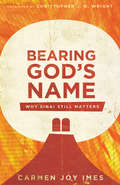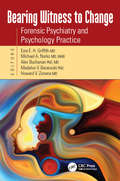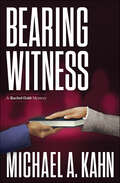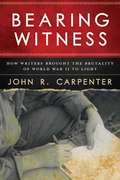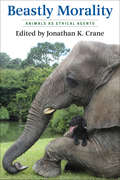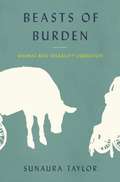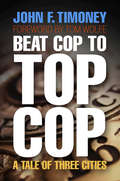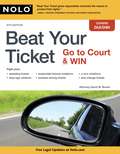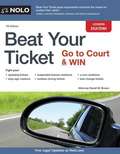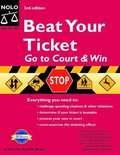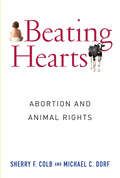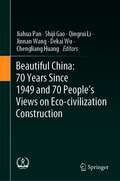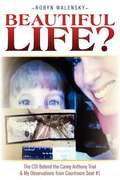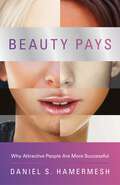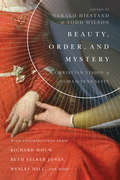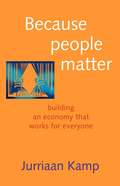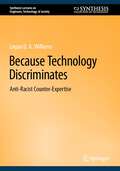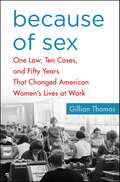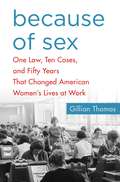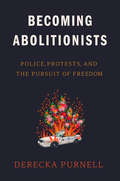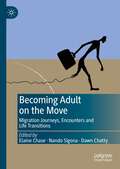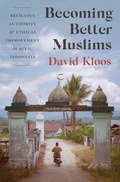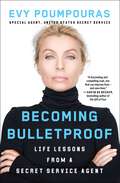- Table View
- List View
Bearing God's Name: Why Sinai Still Matters
by Carmen Joy ImesHave you ever wondered what the Old Testament—especially the Old Testament law—has to do with your Christian life?
Bearing Witness to Change: Forensic Psychiatry and Psychology Practice
by Alec Buchanan Michael A. Norko Ezra Griffith Madelon V. Baranoski Howard ZonanaThis book explores the response of forensic psychiatry and psychology to changes over the last several decades. It presents the disciplines themselves as change agents that have shaped forensic work, public policy, and law. Topics include selected developments in forensic practice, the management and treatment of individuals who have had involvement with law enforcement systems, and the application of administrative principles to the management of forensic entities.
Bearing Witness: A Rachel Gold Mystery (Attorney Rachel Gold Mysteries #0)
by Michael A. Kahn"Bearing Witness grips you from the start. If you have not read Michael Kahn's terrific legal thrillers before, you are in for a treat." —Philip Margolin, New York Times bestselling authorRachel Gold blames it on her mother, Sarah, who convinced her to file what seemed like a simple age-discrimination case on behalf of Ruth Alpert, her mother's best friend. Ruth had been fired just shy of her sixty-third birthday by Beckmann Engineering, a corporate powerhouse known in St. Louis, both for its charitable contributions and vicious lawyers.The first hint that the case might not be so simple comes when a key witness is gunned down in a parking lot before Rachel's eyes. The second comes when Rachel learns that Ruth has knowledge of confidential information that could transform her simple age claim into a massive, multi-million-dollar conspiracy case spanning decades.With the help of her best friend, Benny Goldberg—the grossest (and funniest) law professor in America—the savvy and beautiful Rachel Gold struggles to make sense of a dark scheme hatched more than a fifty years ago, a conspiracy with a bloody trail of murder, mayhem, and treachery that implicates some of the wealthiest and most respected elder citizens in the country. These men have guarded their vile secret for half a century and will take whatever steps are necessary to protect it from disclosure.
Bearing Witness: How Writers Brought the Brutality of World War II to Light
by John R. CarpenterIt has been said that during times of war, the Muses fall silent. However, anyone who has read the major figures of mid-twentieth-century literature—Samuel Beckett, Richard Hillary, Norman Mailer, Albert Camus, Jean-Paul Sartre, and others—can attest that it was through writing that people first tried to communicate and process the horrors that they saw during one of the darkest times in human history even as it broke out and raged on around them.In Bearing Witness, John Carpenter explores how across the world those who experienced the war tried to make sense of it both during and in its immediate aftermath. Writers such as Alexander Solzhenitsyn and Theodore Plievier questioned the ruling parties of the time based on what they saw. Correspondents and writer-soldiers like John Hersey and James Jones revealed the chaotic and bloody reality of the front lines to the public. And civilians, many of who remain anonymous, lent voice to occupation and imprisonment so that those who didn’t survive would not be forgotten. The digestion of a cataclysmic event can take generations. But in this fascinating book, Carpenter brings together all those who did their best to communicate what they saw in the moment so that it could never be lost.
Beastly Morality
by Jonathan K. CraneWe have come to regard nonhuman animals as beings of concern, and we even grant them some legal protections. But until we understand animals as moral agents in and of themselves, they will be nothing more than distant recipients of our largesse. Featuring original essays by philosophers, ethicists, religionists, and ethologists, including Marc Bekoff, Frans de Waal, and Elisabetta Palagi, this collection demonstrates the ability of animals to operate morally, process ideas of good and bad, and think seriously about sociality and virtue. Envisioning nonhuman animals as distinct moral agents marks a paradigm shift in animal studies, as well as philosophy itself. Drawing not only on ethics and religion but also on law, sociology, and cognitive science, the essays in this collection test long-held certainties about moral boundaries and behaviors and prove that nonhuman animals possess complex reasoning capacities, sophisticated empathic sociality, and dynamic and enduring self-conceptions. Rather than claim animal morality is the same as human morality, this book builds an appreciation of the variety and character of animal sensitivities and perceptions across multiple disciplines, moving animal welfarism in promising new directions.
Beastly Morality: Animals as Ethical Agents
by Jonathan K. CraneWe have come to regard nonhuman animals as beings of concern, and we even grant them some legal protections. But until we understand animals as moral agents in and of themselves, they will be nothing more than distant recipients of our largesse. Featuring original essays by philosophers, ethicists, religionists, and ethologists, including Marc Bekoff, Frans de Waal, and Elisabetta Palagi, this collection demonstrates the ability of animals to operate morally, process ideas of good and bad, and think seriously about sociality and virtue.Envisioning nonhuman animals as distinct moral agents marks a paradigm shift in animal studies, as well as philosophy itself. Drawing not only on ethics and religion but also on law, sociology, and cognitive science, the essays in this collection test long-held certainties about moral boundaries and behaviors and prove that nonhuman animals possess complex reasoning capacities, sophisticated empathic sociality, and dynamic and enduring self-conceptions. Rather than claim animal morality is the same as human morality, this book builds an appreciation of the variety and character of animal sensitivities and perceptions across multiple disciplines, moving animal welfarism in promising new directions.
Beasts of Burden: Animal and Disability Liberation
by Sunaura TaylorA deeply provocative inquiry into the intersection of animal and disability liberation and the debut of an important new social critic How much of what we understand of ourselves as "human" depends on our physical and mental abilities how we move (or cannot move) in and interact with the world? And how much of our definition of "human" depends on its difference from "animal"? Drawing on her own experiences as a disabled person, a disability activist, and an animal advocate, author Sunaura Taylor persuades us to think deeply, and sometimes uncomfortably, about what divides the human from the animal, the disabled from the non-disabled and what it might mean to break down those divisions, to claim the animal and the vulnerable in ourselves, in a process she calls "cripping animal ethics." Beasts of Burden suggests that issues of disability and animal justice which have heretofore primarily been presented in opposition are in fact deeply entangled. Fusing philosophy, memoir, science, and the radical truths these disciplines can bring whether about factory farming, disability oppression, or our assumptions of human superiority over animals Taylor draws attention to new worlds of experience and empathy that can open up important avenues of solidarity across species and ability. Beasts of Burden is a wonderfully engaging and elegantly written work, both philosophical and personal, by a brilliant new voice.
Beat Cop to Top Cop
by Tom Wolfe John F. TimoneyBorn in a rough-and-tumble neighborhood of Dublin, John F. Timoney moved to New York with his family in 1961. <p><p>Not long after graduating from high school in the Bronx, he entered the New York City Police Department, quickly rising through the ranks to become the youngest four-star chief in the history of that department. Timoney and the rest of the command assembled under Police Commissioner Bill Bratton implemented a number of radical strategies, protocols, and management systems, including CompStat, that led to historic declines in nearly every category of crime. In 1998, Mayor Ed Rendell of Philadelphia hired Timoney as police commissioner to tackle the city's seemingly intractable violent crime rate. Philadelphia became the great laboratory experiment: Could the systems and policies employed in New York work elsewhere? <p><p>Under Timoney's leadership, crime declined in every major category, especially homicide. A similar decrease not only in crime but also in corruption marked Timoney's tenure in his next position as police chief of Miami, a post he held from 2003 to January 2010. <p>Beat Cop to Top Cop: A Tale of Three Cities documents Timoney's rise, from his days as a tough street cop in the South Bronx to his role as police chief of Miami. <p>This fast-moving narrative by the man Esquire magazine named "America's Top Cop" offers a blueprint for crime prevention through first-person accounts from the street, detailing how big-city chiefs and their teams can tame even the most unruly cities. <p>Policy makers and academicians have long embraced the view that the police could do little to affect crime in the long term. John Timoney has devoted his career to dispelling this notion. Beat Cop to Top Cop tells us how.
Beat Your Ticket
by David BrownEverything you need to fight an unfair ticket! We've all received one -- a traffic ticket that seems completely unfair, the result of an officer's evening quota rather than a serious moving violation. But do you have to pay the penalty and watch your driving record crash and burn? Not if you choose to fight back with Beat Your Ticket. Beat Your Ticket simply and clearly lays out the best strategies for beating tickets in court. The book explains in plain English how to: use the law to fight an unwarranted ticket find out what the police officer plans to say at your trial attack radar and other detection methods pick a jury present your case cross-examine the ticketing officer The 6th edition is extensively updated to reflect your state's current traffic laws and court procedures.
Beat Your Ticket
by David W. BrownFight an unfair ticket in any state! We've all received one a traffic ticket that seems completely unfair, the result of an officer's evening quota rather than a serious moving violation. But do you have to pay the penalty and watch your driving record crash and burn? Not if you choose to fight back! With Nolo's Beat Your Ticket, you'll get the lowdown on the best strategies for beating traffic tickets in court. In plain English, you'll learn how to: -use the law to fight an unwarranted ticket -analyze the case and decide whether to fight or fold - find out what the police officer plans to say at your trial -find legal assistance and get the most out of it - prepare witness testimony -attack radar and other detection methods -pick a jury - present your case -cross examine the ticketing officer Whether you want to contest a common speeding citation, a right of way violation, or a non DUI alcohol related offense, Beat Your Ticket clearly lays out your options. This edition is extensively updated to reflect your state's current traffic laws, including the latest rules, statistics, and court procedures. Are you a California resident? Check out Fight Your Ticket & Win in California.
Beat Your Ticket: Go to Court and Win
by David Wayne BrownThe book covers: speeding, radar and laser tickets, rolling stops, illegal turns and lane changes, cruising through red lights, how to prepare for court, how to make a winning presentation, and how to cross examine the ticketing officer.
Beating Hearts: Abortion and Animal Rights (Critical Perspectives on Animals: Theory, Culture, Science, and Law)
by Michael Dorf Sherry ColbHow can someone who condemns hunting, animal farming, and animal experimentation also favor legal abortion, which is the deliberate destruction of a human fetus? The authors of Beating Hearts aim to reconcile this apparent conflict and examine the surprisingly similar strategic and tactical questions faced by activists in the pro-life and animal rights movements. Beating Hearts maintains that sentience, or the ability to have subjective experiences, grounds a being's entitlement to moral concern. The authors argue that nearly all human exploitation of animals is unjustified. Early abortions do not contradict the sentience principle because they precede fetal sentience, and Beating Hearts explains why the mere potential for sentience does not create moral entitlements. Late abortions do raise serious moral questions, but forcing a woman to carry a child to term is problematic as a form of gender-based exploitation. These ethical explorations lead to a wider discussion of the strategies deployed by the pro-life and animal rights movements. Should legal reforms precede or follow attitudinal changes? Do gory images win over or alienate supporters? Is violence ever principled? By probing the connections between debates about abortion and animal rights, Beating Hearts uses each highly contested set of questions to shed light on the other.
Beautiful China: 70 Years Since 1949 and 70 People’s Views on Eco-civilization Construction
by Jiahua Pan Shiji Gao Qingrui Li Jinnan Wang Dekai Wu Chengliang HuangThis book discusses and studies the basic course of ecological civilization construction in the 70 years since the founding of the People’s Republic of China and summarizes the experience and lessons. It contains 75 articles from 75 top experts and government officials in the field of ecological civilization policy-making and basic theory research in China, including Xi Jinping Thought on Ecological Civilization, ecological culture, green industry economy, environmental quality, legal system, ecological security and so on, so as to provide reference for understanding and studying the progress of ecological environment protection since the founding of China.
Beautiful Life?: The CSI Behind the Casey Anthony Trial & My Observations from Courtroom Seat #1
by Robin WalenskyIn "Beautiful Life?" - The CSI Behind the Casey Anthony Trial & My Observations From Courtroom Seat #1, you will hear first-hand from the CSIs and Detectives at the Orange County Sheriff's Office who investigated the disappearance and death of Caylee Marie Anthony. Veteran News Reporter Robyn Walensky shares her observations from WDBO Radio's Courtroom Seat #1 at the Casey Anthony Trial in Orlando, Florida. Walensky goes one-on-one with Corporal Yuri Melich and Sergeant John Allen who grill Casey Anthony at Universal Studios.
Beauty Pays: Why Attractive People Are More Successful
by Daniel S. HamermeshHow beauty leads to better jobs, better wages, and better spousesMost of us know there is a payoff to looking good, and in the quest for beauty we spend countless hours and billions of dollars on personal grooming, cosmetics, and plastic surgery. But how much better off are the better looking? Based on the evidence, quite a lot. The first book to seriously measure the advantages of beauty, Beauty Pays demonstrates how society favors the beautiful and how better-looking people experience startling but undeniable benefits in all aspects of life. Noted economist Daniel Hamermesh shows that the attractive are more likely to be employed, work more productively and profitably, receive more substantial pay, obtain loan approvals, negotiate loans with better terms, and have more handsome and highly educated spouses. Hamermesh explains why this happens and what it means for the beautiful—and the not-so-beautiful—among us.Exploring whether a universal standard of beauty exists, Hamermesh illustrates how attractive workers make more money, how these amounts differ by gender, and how looks are valued differently based on profession. He considers whether extra pay for good-looking people represents discrimination, and, if so, who is discriminating. Hamermesh investigates the commodification of beauty in dating and how this influences the search for intelligent or high-earning mates, and even examines whether government programs should aid the ugly. He also discusses whether the economic benefits of beauty will persist into the foreseeable future and what the "looks-challenged" can do to overcome their disadvantage.Reflecting on a sensitive issue that touches everyone, Beauty Pays proves that beauty's rewards are anything but superficial.
Beauty, Order, and Mystery: A Christian Vision of Human Sexuality (Center for Pastor Theologians Series)
by Gerald L. HiestandHumans are sexual creatures.Beauty, Order, and Mystery
Because People Matter: Building an Economy that Works for Everyone
by Juriaan KampOur economy is focused on growth and profit. In any given business, success is measured by the flow of money, not the interest of the people involved. In Because People Matter, author Jurriaan Kamp tells us why there are better alternatives. Kamp argues that the world economy is not only based on money, but on human choices as well. It is those human choices that can promote the change necessary to transform our current crisis into a healthier economy that serves everyone. He offers insights on subjects such as a new method of dealing with national income; taxing the use of raw materials rather than income; a world trade based on reciprocity; money without interest; and the liability of shareholders and managers for negligence and environmental damage. Borrowing ideas from prominent economists, Kamp offers a coherent set of conditions for an economy in which it is the people that matter.
Because Technology Discriminates: Anti-Racist Counter-Expertise (Synthesis Lectures on Engineers, Technology, & Society #27)
by Logan D. WilliamsEngineers designing technologies and systems produce problems when they do not account for existing biases in society. Designers have a mandate to make technologies efficiently, economically, and ethically. This textbook is written for both students and practicing designers, engineers, researchers, or artists who want to create more ethical designs; it aims to help readers understand how race is implicated in technology design. Learning from historical and contemporary case studies of engineering and architecture projects will help readers see clearly the power of design decisions to either perpetuate or contest racism. Chapter exercises will change engineers’ mental models to see the bias inherent to existing technological design. By incorporating the knowledge and insights of community-based experts into design projects, readers will begin to practice anti-racist leadership and counter-expertise.
Because of Sex: One Law, Ten Cases, and Fifty Years That Changed American Women's Lives at Work
by Gillian Thomas“Meticulously researched and rewarding to read…Thomas is a gifted storyteller.” —The New York Times Book ReviewBest known as a monumental achievement of the civil rights movement, the 1964 Civil Rights Act also revolutionized the lives of America’s working women. Title VII of the law made it illegal to discriminate “because of sex.” But that simple phrase didn’t mean much until ordinary women began using the law to get justice on the job—and some took their fights all the way to the Supreme Court. Among them were Ida Phillips, denied an assembly line job because she had a preschool-age child; Kim Rawlinson, who fought to become a prison guard—a “man’s job”; Mechelle Vinson, who brought a lawsuit for sexual abuse before “sexual harassment” even had a name; Ann Hopkins, denied partnership at a Big Eight accounting firm because the men in charge thought she needed "a course at charm school”; and most recently, Peggy Young, UPS truck driver, forced to take an unpaid leave while pregnant because she asked for a temporary reprieve from heavy lifting. These unsung heroines’ victories, and those of the other women profiled in Gillian Thomas' Because of Sex, dismantled a “Mad Men” world where women could only hope to play supporting roles; where sexual harassment was “just the way things are”; and where pregnancy meant getting a pink slip.Through first-person accounts and vivid narrative, Because of Sex tells the story of how one law, our highest court, and a few tenacious women changed the American workplace forever.
Because of Sex: One Law, Ten Cases, and Fifty Years that Changed American Women's Lives at Work
by Gillian ThomasBest known as a monumental achievement of the civil rights movement, the 1964 Civil Rights Act also revolutionized the lives of America's working women. Title VII of the law made it illegal to discriminate "because of sex. " But that simple phrase didn't mean much until ordinary women began using the law to get justice on the job--and some took their fights all the way to the Supreme Court. <P><P>Among them were Ida Phillips, denied an assembly line job because she had a preschool-age child; Kim Rawlinson, who fought to become a prison guard--a "man's job"; Mechelle Vinson, who brought a lawsuit for sexual abuse before "sexual harassment" even had a name; Ann Hopkins, denied partnership at a Big Eight accounting firm because the men in charge thought she needed "a course at charm school"; and most recently, Peggy Young, UPS truck driver, forced to take an unpaid leave while pregnant because she asked for a temporary reprieve from heavy lifting. <P><P>These unsung heroines' victories, and those of the other women profiled dismantled a "Mad Men" world where women could only hope to play supporting roles; where sexual harassment was "just the way things are"; and where pregnancy meant getting a pink slip. Through first-person accounts and vivid narrative, Because of Sex tells the story of how one law, our highest court, and a few tenacious women changed the American workplace forever.
Becoming Abolitionists: Police, Protests, and the Pursuit of Freedom
by Derecka Purnell"An informed, provocative, astute consideration of salvific alternatives to contemporary policing and imprisonment." — Starred Review, Kirkus "With deep insight and moral clarity, Purnell invites us not only to imagine a world without police, but to muster the courage to fight for the more just world we know is possible. Becoming Abolitionists is essential reading for our times." — Michelle Alexander, bestselling author of The New Jim Crow "At once specific and sweeping, practical and visionary, Becoming Abolitionists is a triumph of political imagination and a tremendous gift to all movements struggling towards liberation. Do not miss its brilliance!" — Naomi Klein, bestselling author of The Shock DoctrineFor more than a century, activists in the United States have tried to reform the police. From community policing initiatives to increasing diversity, none of it has stopped the police from killing about three people a day. Millions of people continue to protest police violence because these "solutions" do not match the problem: the police cannot be reformed. In Becoming Abolitionists, Purnell draws from her experiences as a lawyer, writer, and organizer initially skeptical about police abolition. She saw too much sexual violence and buried too many friends to consider getting rid of police in her hometown of St. Louis, let alone the nation. But the police were a placebo. Calling them felt like something, and something feels like everything when the other option seems like nothing.Purnell details how multi-racial social movements rooted in rebellion, risk-taking, and revolutionary love pushed her and a generation of activists toward abolition. The book travels across geography and time, and offers lessons that activists have learned from Ferguson to South Africa, from Reconstruction to contemporary protests against police shootings. Here, Purnell argues that police can not be reformed and invites readers to envision new systems that work to address the root causes of violence. Becoming Abolitionists shows that abolition is not solely about getting rid of police, but a commitment to create and support different answers to the problem of harm in society, and, most excitingly, an opportunity to reduce and eliminate harm in the first place.
Becoming Adult on the Move: Migration Journeys, Encounters and Life Transitions
by Dawn Chatty Elaine Chase Nando SigonaThis edited collection situates the migration of children and young people into Europe within a global framework of analysis and provides a holistic perspective that encompasses cultural media, ethnographic research and policy analysis. Drawing on a unique study of young unaccompanied migrants who subsequently became ‘adult’ within the UK and Italy, it examines their different trajectories and how they were impacted by their ability to secure legal status. Divided into three interlinked sections, it begins by examining the cultural repertoires about migration and adulthood to which migrants are sensitized in their countries of origin from a young age. This forms the contexts within which their direct experiences of turning 18 in a different country are explored. These combined insights are framed by an analysis of related policies which bureaucratically and institutionally shape these migratory experiences. This interdisciplinary volume will appeal to scholars and students in the fields of migration studies, international development, geography, sociology, anthropology, youth studies, law, education, health and wellbeing, social care and cultural studies.
Becoming Better Muslims: Religious Authority and Ethical Improvement in Aceh, Indonesia
by David KloosHow do ordinary Muslims deal with and influence the increasingly pervasive Islamic norms set by institutions of the state and religion? Becoming Better Muslims offers an innovative account of the dynamic interactions between individual Muslims, religious authorities, and the state in Aceh, Indonesia. Relying on extensive historical and ethnographic research, David Kloos offers a detailed analysis of religious life in Aceh and an investigation into today’s personal processes of ethical formation.Aceh is known for its history of rebellion and its recent implementation of Islamic law. Debunking the stereotypical image of the Acehnese as inherently pious or fanatical, Kloos shows how Acehnese Muslims reflect consciously on their faith and often frame their religious lives in terms of gradual ethical improvement. Revealing that most Muslims view their lives through the prism of uncertainty, doubt, and imperfection, he argues that these senses of failure contribute strongly to how individuals try to become better Muslims. He also demonstrates that while religious authorities have encroached on believers and local communities, constraining them in their beliefs and practices, the same process has enabled ordinary Muslims to reflect on moral choices and dilemmas, and to shape the ways religious norms are enforced.Arguing that Islamic norms are carried out through daily negotiations and contestations rather than blind conformity, Becoming Better Muslims examines how ordinary people develop and exercise their religious agency.
Becoming Biosubjects
by Neil Gerlach Rebecca Sullivan Priscilla Walton Sheryl HamiltonBecoming Biosubjects examines the ways in which the Canadian government, media, courts, and everyday Canadians are making sense of the challenges being posed by biotechnologies. The authors argue that the human body is now being understood as something that is fluid and without fixed meaning. This has significant implications both for how we understand ourselves and how we see our relationships with other forms of life.Focusing on four major issues, the authors examine the ways in which genetic technologies are shaping criminal justice practices, how policies on reproductive technologies have shifted in response to biotechnologies, the debates surrounding the patenting of higher life forms, and the Canadian (and global) response to bioterrorism. Regulatory strategies in government and the courts are continually evolving and are affected by changing public perceptions of scientific knowledge. The legal and cultural shifts outlined in Becoming Biosubjects call into question what it means to be a Canadian, a citizen, and a human being.
Becoming Bulletproof: Protect Yourself, Read People, Influence Situations, and Live Fearlessly
by Evy PoumpourasFormer Secret Service agent and star of Bravo&’s Spy Games Evy Poumpouras shares lessons learned from protecting presidents, as well insights and skills from the oldest and most elite security force in the world to help you prepare for stressful situations, instantly read people, influence how you are perceived, and live a more fearless life.Becoming Bulletproof means transforming yourself into a stronger, more confident, and more powerful person. Evy Poumpouras—former Secret Service agent to three presidents and one of only five women to receive the Medal of Valor—demonstrates how we can overcome our everyday fears, have difficult conversations, know who to trust and who might not have our best interests at heart, influence situations, and prepare for the unexpected. When you have become bulletproof, you are your best, most courageous, and most powerful version of you. Poumpouras shows us that ultimately true strength is found in the mind, not the body. Courage involves facing our fears, but it is also about resilience, grit, and having a built-in BS detector and knowing how to use it. In Becoming Bulletproof, Poumpouras demonstrates how to heighten our natural instincts to employ all these qualities and move from fear to fearlessness.
